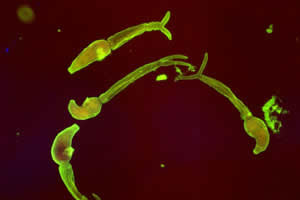Schistosomiasis, known as snail fever orbilharzia,is a tropical disease caused by several types of parasites called schistosomes that infest open bodies of water. A scistosoma vaccine has been developed that could help eradicate this parasitic disease and save millions of lives.
Snail fever is second only to malaria in terms of its devastating social, economic, and public health impact in tropical and subtropical regions of the world.
Children acquire the schistosomiasis disease by swimming in infected water where the parasitic larvae shed from snails can easily enter through their skin. Upon contact the parasite burrows into the skin, then mature into an adult worm that migrates to other body parts and cause chronic illness that can damage internal organs and impair growth and brain development. This waterborne disease can enter the body through any contact with infested water such as washing hands, washing food, fishing, and farming, affecting habitants as well as tourists.
The schistosome vaccine can be administered to small children in order to prevent severe infection in the high risk age range of 3-12 years old, when contact with parasite-infected water is maximized. This schistosome treatment would greatly reduce the need for logistically difficult and expensive drug-based programs such as the chemotherapy treatments which are expensive, difficult to administer, and fail to significantly reduce transmission of the disease in endemic areas.
According to the World Health Organization about 750 million people are at risk for schistosomiasis and should be vaccinated. Currently there are no commercially available vaccines against schistosomiasis which afflicts over 200 million people in 76 different countries primarily in Asia, Africa and South America. Symptomatic schistosomiasis can result in increased susceptibility to STD infection including HIV which is prevalent in many countries plagued by schistosoma.
Current schistosoma vaccine research is focused on a membrane protein, tetraspanin, however, this membrane protein has been shown to be highly variable which limits the potential long-term efficacy of those vaccines. Chemotherapeutic drugs are considered safe and effective for the treatment of schistosomiasis, however re-infection frequently occurs following drug treatment. An effective vaccine is critical toward providing long-term treatment.
Immunization formulation tests with a sub unit of the schistosome protein, designated as Sm-p80, resulted in a significant level of protective immunity against schistosome infection in mice and baboons, and the development of this Sm-p80 -DNA based schistosoma vaccine has been successful in eliminating 100% of the schistosoma pathogen in recent trials. The animal trials were shown to induce protective immunity in mice and baboons, and completely eliminate the parasite in the host.
This schistosoma vaccine offers unique opportunities for organizations to market it as a method for completely eliminating schistosoma disease. Potential partners include:
Based on the promising test results, the UNDP/World Bank/WHO-TDR special panel has designated, Sm-p80 as one of the priority antigens with “established credentials, needing further development” and Sm-p80 is now considered as one of the “first-tier candidates” by international experts in the field.

The vaccines advantages make it easy to sell.
由于技术保密工作限制,技术信息无法完全展现,请通过邮箱或短信联系我们,获取更多技术资料。
parasites called schistosomes
infest open bodies
public health impact
damage internal organs
re-infection frequently occurs
